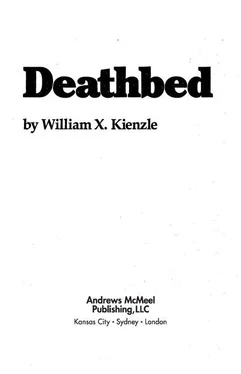Recognizing from the priest’s expression that his friend was not all that happy with his analysis, the Inspector hastened to add, “Nevertheless, it is good that you are aware of these possibilities. Sometimes merely the awareness of possible danger helps to avert it.” He grew reflective. “All too often when a homicide does occur, friends, relatives, and acquaintances of those involved profess astonishment, with comments along the line of, ‘I never would have dreamed . . .’Or they express amazement at what they consider the tenuousness of the killer’s motivation.” He shook his head. “One can never gauge the extremes to which a fellow human may be driven by what the rest of us would dismiss as a mere pinprick.”
He smiled reassuringly. “If nothing else, Father, yours is an interesting conjecture. But,” he added seriously, “it is quite possible, even probable, is it not, that all these things may happen—doctor dismissed, aide fired, older couple retired—without any harm coming to either Sister Eileen or the hospital?”
“Perfectly possible, even probable,” Koesler replied. He shook his head ruefully. “You’re right of course. And I must say I feel more at ease just for having expressed my fears to you. This must work as confession sometimes does. The talking cure. Just saying it out loud, telling someone, takes a good deal of the onus from what’s been bothering one.
“So, Inspector, I don’t know whether anyone in this hospital is any safer for my telling you my concerns, but I feel better.” Koesler laughed self-consciously.
Koznicki joined in the laughter. “Well, then, Father, the evening has not been a total waste.”
“I’ll just get us some coffee and I’ll shut up so you can tell me what’s going on in your interesting life. We can drink a toast to the prospect of your not being called in here on any official business in the foreseeable future.”
“Father, gladly will I drink to that.”
* * *
Bruce Whitaker was surprised to find that the tacky marquee of the Back Porch Theatre announced a change in the bill of fare. The Manic Sperm had enjoyed one of the briefer runs in show-biz history. After less than a week, The Manic Sperm had been mothballed in favor of a new and equally experimental production of an original drama entitled, The Roamin’ Ovum.
En route to his attic room, Bruce halted at the rear of the tiny theater. He could not see clearly through the dark and smoke, but there seemed to be no more than the usual handful of patrons, some noisily taunting the actors, who, between trying to remember their lines and their cues, returned the ridicule.
In the brief time Whitaker watched the performance, he had a devilish time trying to make some sense of what was going on. It appeared to be a two-character play. At least there were but two people on stage and no indication anyone else either had preceded or would follow them. He was unable to tell whether the actors were men, women, or one of each. Both had very long hair, both wore bulky and indiscriminate costumes, and both yelled so much their voices were hoarse.
The plot, as near as Whitaker could define it, seemed to be a contest of shouted insults and imprecations. If there was anything else of substance to the plot, it was the posed question of who was more important in love-making, the male or female. Or, as the actors themselves put it: Who had more fun, the sperm or the ovum? At this point, their clothing dropped to the floor rather astonishingly quickly. Thus solving one puzzle: It was a man and a woman onstage.
In no time at all, the woman clutched herself into a fetal position and began to roll toward the male. That, Whitaker reasoned, must be whence the play’s title, The Roamin’ Ovum, had originated. Though he had seen neither play from start to finish, it seemed to Bruce that there were great similarities between The Manic Sperm and The Roamin’ Ovum. Now that he thought of it, the playwright’s name on the billboard out front had seemed familiar. The same author had written both plays. Apparently the playwright’s talent was limited to one thought. And that not a very advanced one.
Whitaker did not wait to learn whether the sperm or the egg had more fun. He didn’t care. Besides, he was very depressed over those damned curtain hooks.
He continued up to his attic room, an extremely appropriate place in which to feel depressed.
If all this were not enough, after the performance of The Roamin’ Ovum, Whitaker’s landlord, who had portrayed the Sperm in the theater’s previous and current productions, stormed up to the attic and pounded on the door until it almost came off the one hinge that held it to the frame.
Strangely, Whitaker never could recall the landlord’s name. Bruce always thought of him as “The Sperm,” though he was never brazen enough to address him as such.
In any case, The Sperm upbraided Whitaker mercilessly for everything from not sweeping the theater clean enough to not attending any of the performances. This after having ordered Whitaker not to return after he walked out on one of the very few performances of The Manic Sperm !
Bruce felt very low.
At the core of his dejection, of course, was his failure to mutilate the IUDs, having attacked instead boxes full of curtain hooks. Added to that was his frustration, fast on the heels of his promise to her, in not having aided Ethel in her quest for security.
Now he faced the painful necessity of telling all this to his colleagues tomorrow.
Bruce was strongly tempted to skip the whole thing. What could they do to him if he never again visited Van’s Can? They were in. He was out. If he never returned, they could do nothing till they got out. By then, his parole would be completed and he could get out of town.
This was a more pleasant thought, so he dwelt on it. Leaving town, all the bad incidents behind him. Maybe—could he dare think it?—Ethel would go with him. He was utterly devoid of any experience in this field. Ethel was the first female, with the possible exception of his mother, who had ever seemed to take a real interest in him. He did not know how to handle this. But he was eager to learn.
First, he would have to justify Ethel’s faith in him. And he did have more plans. Lots more. He had been studying, asking questions, and making some personal observations. It was quite possible that one or another of these plans could do the job.
He could see it now: The first of his clever plans that worked would bring the media down on St. Vincent’s Hospital like dry sponges that needed news instead of water. As soon as the glare of publicity hit the hospital, the archdiocese would be forced to take action. And that, without doubt, would push Sister Eileen out of her position in the hospital. St. Vincent’s would once again be a Catholic hospital loyal to the Pope and his teaching authority. And, added boon, he would fulfill his pledge to Ethel. Sister Eileen would be removed and Ethel’s job would be unthreatened.
He wondered if it would be difficult to convince her to go somewhere else with him. She would have to leave a secure job. But it would be his success that would have secured that job. Given all this, would she see that he was her security and leave with him?
God, he hoped so.
This was such a pleasant thought he decided to go to sleep dreaming about it. The whole concept gave him strength to confront his colleagues on the morrow.
* * *
Joe Cox lay on his side looking out the window. A light snow was falling. From the high-rise apartment at night, the city resembled a large, self-motivated toy.
There wasn’t much traffic at this hour. One could watch headlights or taillights, depending on the cars’ direction. Here and there in apartments and offices soft lights illuminated late labor or the winding-down after a day’s work.
Читать дальше












